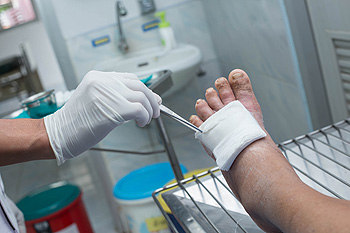Diabetic foot ulcers are slow healing wounds that appear on the feet of individuals with diabetes and can become a very serious health issue. Almost a quarter of all individuals diagnosed with diabetes will develop a foot ulcer at some point in their life. There are several types of diabetic foot ulcers, and knowing which type you have can help determine the most effective treatment. Neuropathic ulcers occur when nerve damage from diabetic neuropathy prevents the patient with diabetes from feeling pain from an injury. This allows the wound to progress before you are even aware of it, increasing the risk of infection. Ischemic ulcers may be caused by a lack of blood flow to the feet. These types of ulcers are often difficult to heal. Neuroischemic ulcers are the most difficult to heal and occur in individuals who have both neuropathy and poor circulation. Infected wounds occur in half of diabetic patients with foot ulcers, and require close medical attention. If you have diabetic foot ulcers, it is highly recommended that you are under the care of a podiatrist who can help you look after your wounds and prevent severe complications.
Wound care is an important part in dealing with diabetes. If you have diabetes and a foot wound or would like more information about wound care for diabetics, consult with Dr. Thomas E. Silver from Westwood Foot Clinic. Our doctor will assess your condition and provide you with quality foot and ankle treatment.
What Is Wound Care?
Wound care is the practice of taking proper care of a wound. This can range from the smallest to the largest of wounds. While everyone can benefit from proper wound care, it is much more important for diabetics. Diabetics often suffer from poor blood circulation which causes wounds to heal much slower than they would in a non-diabetic.
What Is the Importance of Wound Care?
While it may not seem apparent with small ulcers on the foot, for diabetics, any size ulcer can become infected. Diabetics often also suffer from neuropathy, or nerve loss. This means they might not even feel when they have an ulcer on their foot. If the wound becomes severely infected, amputation may be necessary. Therefore, it is of the upmost importance to properly care for any and all foot wounds.
How to Care for Wounds
The best way to care for foot wounds is to prevent them. For diabetics, this means daily inspections of the feet for any signs of abnormalities or ulcers. It is also recommended to see a podiatrist several times a year for a foot inspection. If you do have an ulcer, run the wound under water to clear dirt from the wound; then apply antibiotic ointment to the wound and cover with a bandage. Bandages should be changed daily and keeping pressure off the wound is smart. It is advised to see a podiatrist, who can keep an eye on it.
If you have any questions, please feel free to contact our office located in Golden Valley, MN . We offer the newest diagnostic and treatment technologies for all your foot care needs.
Read more about Wound Care
